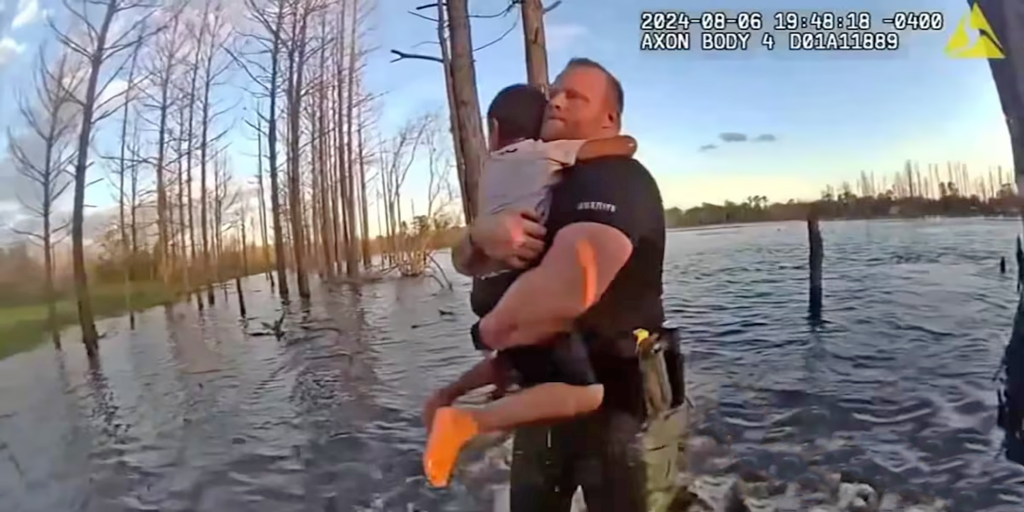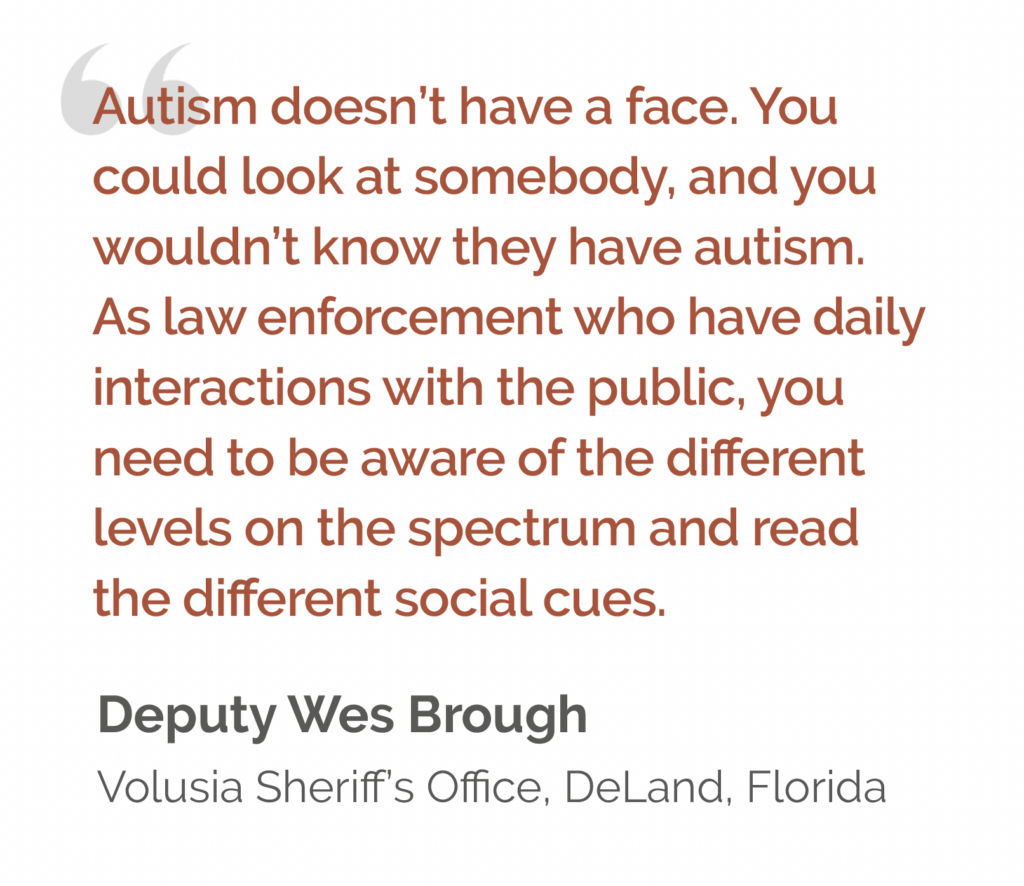

By Jody Garlock
Deputy Wes Brough has been in law enforcement for what he matter-of-factly describes as “a crazy” five years. In that short time with the Volusia County Sheriff’s Office in DeLand, Florida, he has worked AMBER Alerts, saved a teen who was contemplating jumping off a bridge, and, most recently, been hailed a hero for rescuing a missing 5-year-old boy with autism.
In the latter case, the dramatic body-cam footage of Brough running into a large pond to carry the missing child to safety put him in a national spotlight after the video went viral—and showed how dangerously close the story was to a sad outcome.
That August 2024 day remains fresh in his mind. Brough (pronounced “Bruff”) was on routine patrol in Deltona (in east-central Florida) when a 911 call reporting the child missing came in—a call he and other officers were able to hear in real time thanks to a new telecommunication system.
 Brough was first on the scene, followed shortly by another officer who helped search the family’s house to confirm the boy wasn’t there. Dispatched officers soon arrived and the search area expanded.
Brough was first on the scene, followed shortly by another officer who helped search the family’s house to confirm the boy wasn’t there. Dispatched officers soon arrived and the search area expanded.
After hearing of a possible sighting of the child behind a nearby home, Brough’s autism awareness training kicked in. Knowing that area had wooded wetlands and that children with autism are drawn to water, Brough took off running. Hurling tree debris and calling the boy’s name as he approached a nearby trail and pond, the breathless deputy would momentarily stop to look for any signs of movement in the water or footprints on the swampy ground.
At first Brough didn’t see any signs of the child. But then the boy, who is nonverbal, made a noise, likely after noticing Brough through the trees. The deputy ran toward the sound, and after spotting the boy in the pond, yelled, “I got him! I got him!” as he ran into the near-waist-high water where the 5-year-old was holding on to a branch. He would soon cling safely to Brough as they made their way back to land. There, as darkness neared, medics checked the boy’s health before he was reunited with his frightened family. The swift recovery was completed about 20 minutes after the 911 call that reported the child missing.
We talked with Brough about the incident and the lessons it may hold for others in law enforcement.
How does it feel to be called a hero?
That’s a big title honestly—especially when anybody in my position would have done the exact same thing. I’m very honored, but I’m staying humble and giving the glory to God for helping me do the right thing in the right moment.
What type of training helped prepare you for such an incident?
We have critical incident training when we come through the sheriff’s office, and it focuses on different types of behavior. We also go through autism awareness training which includes meeting with children with autism and their families who live in our community; it’s very in depth. It covers the dangers a child with autism can face, and understanding the biggest cause of death: drowning. That’s a big factor here in Florida, where there’s so much water. We learn how to interact with children with autism and the different levels of the autism spectrum. We also look at different scenarios that we in law enforcement might face, whether it’s responding to a runaway child or a suspicious person. You never know when the person you’re interacting with may have autism, so being aware, and picking up on social cues, is important.
Are there ways to better engage the public about missing autistic children?
There’s always room for more communication between an agency and the public, especially on a subject like this. An easy way is through social media posts. Also, parents should be encouraged to never hesitate to call 911 if their child goes missing. The boy’s family did a wonderful job of calling as soon as they heard the alarm on their door go off. We’d rather have the call get canceled on the way to search for a missing child instead of being 20 minutes behind the curve.
What lessons did you learn that others could apply—what are your takeaways?
One, a lot of good work gets done when you stay calm under pressure. And two, it’s important to have a sense of urgency. Too often complacency can kick in; you think a missing kid may be at a friend’s house or hiding in a shed. You might walk rather than run. When I picked up the log the boy was holding onto in the water, it broke in half. It was only a matter of time before it broke while he was holding on to it, or that he went out deeper into the water. Hindsight is 20/20, but I’m glad I had the sense of urgency to run from the road to the pond. It was moving with a purpose. There can’t be hesitation when the priority is someone’s life.
![SIDEBAR with headline "4 tips: Be in the know about autism" [TEXT] Children with autism spectrum disorder (ASD) wander or go missing at a higher rate than other children—a behavior known as elopement. They may be trying to get away from loud sounds or stimuli, or seeking out places of special interest that pique their curiosities. The National Autism Association (NAA) shares the following tips all first responders should know. • Know the signs: A person with autism may have an impaired sense of danger, and, as such, may wander into water, traffic, or other perils. They may not speak or respond to their name, and may appear deaf. They need time to process questions, may repeat phrases, and may try to run away or hide. And they may rock, pace, spin, or flap their hands. • Know how to search: Act quickly and treat the case as critical since a child with autism may head straight to a source of danger, such as water, traffic, or an abandoned vehicle. First search any nearby body of water, even if the child is thought to fear it. Ask about the child’s likes and dislikes, including potential fears such as search dogs or siren sounds. • Know how to interact: Don’t assume a person with autism will respond to “stop” or other commands or questions. If they’re not in danger, allow space and avoid touching. Get on the child’s level and speak in a reassuring tone, using simple phrases—even if the person is nonverbal. Offering a phone to a nonverbal person to communicate via typing may be helpful. • Know about resources: Beyond agency training, law enforcement officers can find online resources. The National Autism Association offers a downloadable brochure with tips for first responders on its website. Additionally, the National Center for Missing & Exploited Children also offers excellent online resources (visit missingkids.org).](https://amberadvocate.org/wp-content/uploads/2024/10/AA60-sidebar-autism-1.png)
